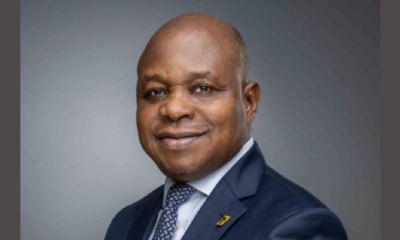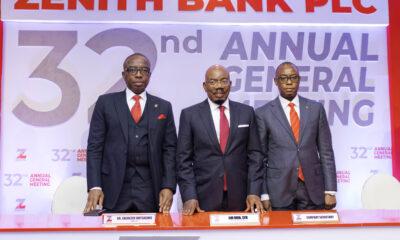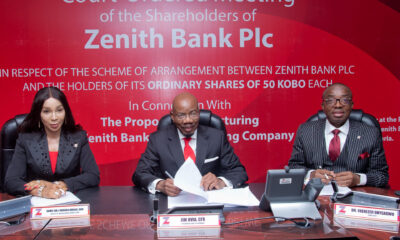Barely a year after the launch of its Agent Credit scheme, First Bank of Nigeria Limited, Nigeria’s leading financial inclusion services provider, has announced that it has economically empowered its Firstmonie Agents with the sum of N100 billion. The Bank currently has over 120,000 Firstmonie Agents, spread across 772 Local Government Areas in the country.
The Agent Credit scheme was created by the banking giant to promote and expand the business activities of its foremost agent banking platform – Firstmonie Agents – whilst putting them at an advantage to positively impact their immediate environment.
Firstmonie Agents have been integral to bridging the financial exclusion gap, providing convenient banking services that are easily accessible, thereby saving time and travel costs for individuals in the suburbs and remote environments that have no access to financial services.
The Bank’s financial inclusion activities are in line with the mandate of the Central Bank of Nigeria (CBN) to ensure the availability of affordable financial products and services to all individuals and groups of people in the country, irrespective of location, literacy levels, familiarity with technology and accessibility to modern infrastructural facilities. The Firstmonie Agent channel is amongst the Bank’s many initiatives to expand financial access in the country.
Reiterating the Bank’s role in deepening financial inclusion in the country, Chuma Ezirim, Group Executive, e-Business & Retail Products, said “we are truly excited about the tremendous impact of the Agent Credit on the performance of our Firstmonie Agents nationwide. Since the introduction of the Agent Credit to support our ‘Human ATMs’ as we fondly call our Firstmonie Agents, they have recorded immense growth in their businesses, at levels they never envisaged in such a short period.
Our key goal is to continue to deliver financial services to the underserved and unbanked populations, employing modern technology for processing real-time transactions and in doing so, contribute to building capacities and learning new skills in information technology, cash management and relationship management for our FirstMonie agents.
We encourage our Firstmonie Agents to keep being exemplary in setting the pace to promote financial inclusion as we collectively work towards the continuous growth and development of the national economy.”
About FirstBank
First Bank of Nigeria Limited (FirstBank) is the premier Bank in West Africa and the leading financial inclusion services provider in Nigeria for over 127 years.
With over 750 business locations and over 120,000 Banking Agents spread across 99% of the 774 Local Government Areas in Nigeria, FirstBank provides a comprehensive range of retail and corporate financial services to serve its over 30 million customers. The Bank has international presence through its subsidiaries, FBN Bank (UK) Limited in London and Paris, FBNBank in the Republic of Congo, Ghana, The Gambia, Guinea, Sierra-Leone and Senegal, as well as a Representative Office in Beijing.
The Bank has been handy at promoting digital payment in the country and has issued over 10million cards, the first bank to achieve such a milestone in the country. FirstBank’s cashless transaction drive extends to having more than 12million people on its USSD Quick Banking service through the nationally renowned *894# Banking code and over 4.5 million people on FirstMobile platform.
Since its establishment in 1894, FirstBank has consistently built relationships with customers focusing on the fundamentals of good corporate governance, strong liquidity, optimised risk management and leadership. Over the years, the Bank has led the financing of private investment in infrastructure development in the Nigerian economy by playing key roles in the Federal Government’s privatisation and commercialisation schemes. With its global reach, FirstBank provides prospective investors wishing to explore the vast business opportunities that are available in Nigeria, an internationally competitive world-class brand and a credible financial partner.
FirstBank has been named “Most Valuable Bank Brand in Nigeria” six times in a row (2011 – 2016) by the globally renowned “The Banker Magazine” of the Financial Times Group; “Best Retail Bank in Nigeria” for seven consecutive years (2011 – 2017) by the Asian Banker International Excellence in Retail Financial Services Awards and “Best Bank in Nigeria” by Global Finance for 15 years. Our brand purpose is always to put customers, partners and stakeholders at the heart of our business, even as we standardise customer experience and excellence in financial solutions across sub-Saharan Africa, in consonance with our brand vision “To be the partner of the first choice in building your future”.
Our brand promise is always to deliver the ultimate “gold standard” of value and excellence. This commitment is anchored on our inherent values of passion, partnership and people, to position You First in every respect.




 Naira4 weeks ago
Naira4 weeks ago


 Naira3 weeks ago
Naira3 weeks ago


 News4 weeks ago
News4 weeks ago
 Travel4 weeks ago
Travel4 weeks ago




 Naira4 weeks ago
Naira4 weeks ago


 Jobs3 weeks ago
Jobs3 weeks ago
 Naira3 weeks ago
Naira3 weeks ago


 Travel3 weeks ago
Travel3 weeks ago



















